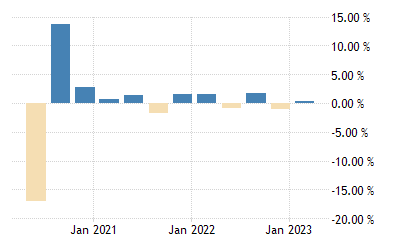Business
The South African economy experienced a modest growth of 0.4% in the first quarter of 2023  By Editor
By Editor
 July 1st, 2023 The global economic environment played a significant role in shaping South Africa's growth trajectory. Sluggish global demand and a slowdown in international trade impacted the country's export-oriented industries. Furthermore, trade tensions between major economies, such as the United States and China, resulted in reduced global trade volumes, affecting South Africa's export competitiveness.
July 1st, 2023 The global economic environment played a significant role in shaping South Africa's growth trajectory. Sluggish global demand and a slowdown in international trade impacted the country's export-oriented industries. Furthermore, trade tensions between major economies, such as the United States and China, resulted in reduced global trade volumes, affecting South Africa's export competitiveness. 
The South African economy experienced a modest growth of 0.4% during the given period. Several factors contributed to this relatively small expansion, which can be analyzed in detail.
The global economic environment played a significant role in shaping South Africa's growth trajectory. Sluggish global demand and a slowdown in international trade impacted the country's export-oriented industries. Furthermore, trade tensions between major economies, such as the United States and China, resulted in reduced global trade volumes, affecting South Africa's export competitiveness.
Consumer spending is a crucial driver of economic growth in any country. In South Africa, subdued consumer confidence and high levels of household debt restrained domestic consumption. High unemployment rates and low wage growth limited disposable incomes, causing consumers to tighten their spending. The impact of the COVID-19 pandemic further exacerbated these challenges, as lockdown measures and job losses adversely affected consumer behavior.
The investment climate in South Africa has faced significant headwinds in recent years, impacting economic growth. Uncertainty surrounding policies, particularly in key sectors like mining and energy, discouraged both domestic and foreign investment. Concerns about regulatory issues, corruption, and bureaucratic inefficiencies further dampened investor sentiment. Insufficient investment in infrastructure, such as transportation and energy, also constrained economic development.
South Africa has faced persistent energy challenges, including frequent power outages and an unreliable electricity supply. These issues have negatively affected various sectors of the economy, such as manufacturing and mining. The lack of consistent and affordable energy supply hampers productivity and hinders the country's ability to attract investments. Addressing these energy constraints is vital for sustained economic growth.
The South African economy has struggled with structural constraints that impede its growth potential. Inadequate education and skills development have resulted in a mismatch between the labor market and industry requirements. This skills gap reduces productivity and restricts the growth of sectors requiring specialized expertise. Furthermore, persistent income inequality and high levels of poverty hinder inclusive growth and perpetuate socio-economic disparities.
Policy uncertainty can have a detrimental impact on economic growth. In recent years, South Africa has experienced uncertainty regarding key policy areas, such as land reform, mining regulations, and economic transformation. This uncertainty has created a cautious investment climate and discouraged both domestic and foreign investors. Clear and consistent policies are necessary to provide a conducive environment for sustainable economic growth.
In conclusion, the small growth of the South African economy can be attributed to a combination of external factors, subdued domestic consumption, challenges in the investment climate, energy constraints, structural limitations, and policy uncertainty. Addressing these challenges and implementing measures to promote investment, improve infrastructure, enhance skills development, and reduce inequality will be crucial for fostering stronger and more inclusive economic growth in South Africa.
Facebook
WhatsApp

 By Editor
By Editor  July 1st, 2023
July 1st, 2023 